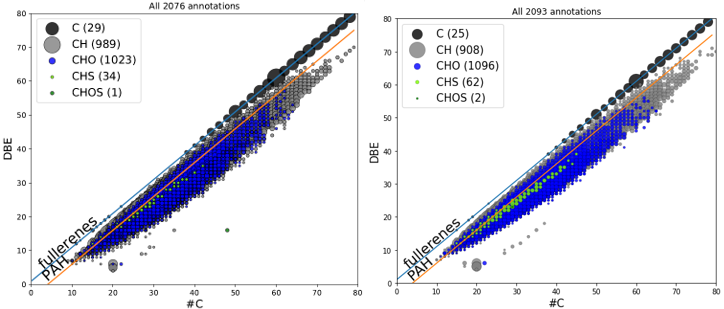- 1Aix Marseille Univ, CNRS, Institut Origines, PIIM, Marseille, France
- 2Aix Marseille Univ, CNRS, CNES, Institut Origines, LAM, Marseille, France
- 3Centre de Recherche sur les Ions, les Matériaux et la Photonique CIMAP-CIRIL-Ganil, Normandie Univ, ENSICAEN, UNICAEN, CEA, CNRS, 14000 Caen, France
- 4International Joint Laboratory—iC2MC: Complex Matrices Molecular Characterization, Total Research and Technology Gonfreville (TRTG), 76700 Harfleur, France
- 5Normandie Université, COBRA, UMR 6014 et FR 3038, Université de Rouen-Normandie, INSA de Rouen, CNRS, IRCOF, 76130 Mont Saint Aignan, France
- 6Helmholtz Zentrum München, Analytical BioGeoChemistry, Neuherberg, Germany
- 7Technische Universität München, Chair of Analytical Food Chemistry, Freising-Weihenstephan, Germany
- 8Johns Hopkins University Applied Physics Laboratory, Laurel, MD, USA
- 9LMU Munich, Faculty of Physics, Schellingstraße 4, 80799 Munich, Germany
- 10Excellence Cluster ORIGINS, Boltzmannstraße 2, 85748 Garching, Germany
- 11Freie Universität Berlin, Institute of Geological Sciences, Berlin, Germany
- 12Institute of Space Systems, University of Stuttgart, Germany
- 13Geomicrobiology, Department of Geosciences, Eberhard-Karls-University Tuebingen, Schnarrenbergstrasse 94-96, 72076 Tuebingen, Germany
We present the results of the implantation of energetic sulfur ions in icy samples (H2O:C3H8 and H2O:C3H7OH) in temperature conditions relevant to Europa and other Jovian satellites. The surface of the Jovian moons experiences an intense bombardment of energetic particles, including sulfur ions over a large range of energy[1][2]. Any organic matter emplaced onto the surface from the internal ocean would be processed by this bombardment, with the possibility for sulfur to be included into the resulting products. As a results, the future space missions to the galileans moons (NASA’s Europa Clipper and ESA’s JUICE) may encounter such processed organic matter, which will complicate the characterization of the organic matter from the interior. The MASPEX [3] and SUDA [4] instruments in particular will get the opportunity to characterize the organic matter on Europa’s surface with unprecedented sentitivity and mass resolution.
Here, in temperature conditions relevant to Europa (80 K), we investigate the composition of the organic residues generated by the irradiation of a water:propane ice and a water:propanol ice with a 105 keV S7+ ion beam. Propane is the simplest alkane that can be condensed at a temperature relevant to Europa’s surface, and propanol is the corresponding alcohol. The irradiated samples were slowly warmed up to 300 K to sublimate the volatiles and leave the refractory organic residues. The residues were analyzed with Ultra-High Resolution Mass Spectrometry using two ionization techniques (laser desorption and electrospray).
The analysis of the residue from the irradiation of the water:propane ice shows a very diverse (2000 + unique formulas) organic matter, with heavy molecules (up to m/z>800). We find large numbers of aromatic CH species (Figure 1, left) and oxygen-rich, less aromatic species, depending on the ionization technique used. Organosulfurs are found both in CHS form and CHOS; they are minor both in number and intensity, but demonstrate the possibility of forming organosulfurs in the surface conditions of Europa through sulfur implantation with any organic. [5]
The residue resulting from the water:propanol sample, as seen with laser desorption is very similar, without any noticeable difference between the number and intensity of O-bearing annotations, or aromaticity (Figure 1). Twice as many CHS annotations are found in the water:propanol residue compared to water :propane.
The dose used in our study represents a geologically short time on the surface of Europa (from a few days to a few thousands of year, depending on the region considered). This indicates that the properties of organic precursors may swiftly be erased by radiation processing on the surface. Future work with different doses and precursor species will better constrain how radiation chemistry alters organic signatures on the surface.
[1] J.F. Cooper, et al.,. Icarus, 149(1), 133-159. (2001)
[2] C. Paranicas et al.,., Europa. U. Arizona Press, Tucson, 529 (2009)
[3] Waite Jr, J. H., et al. Space Science Reviews 220.3 (2024): 30.
[4] Goode, W., et al. Planetary and Space Science, 227, 105633. (2023).
[5] Bouquet, A., et al. The Planetary Science Journal, 5(4), 102 (2024).

Fig1 : #C vs DBE (Double Bond Equivalent) of the annotations obtained by Laser Desorption Ionization – Fourier Transform Ion Cyclotron Resonance (LDI-FTICR) applied to the residue of the S-implanted Water :Propane Ice (left) and Water :Propanol Ice (right).
How to cite: Bouquet, A., Pires da Costa, C., Boduch, P., Rothard, H., Domaracka, A., Danger, G., Schmitz, I., Afonso, C., Schmitt-Kopplin, P., Hue, V., Nordheim, T., Ruf, A., Duvernay, F., Napoleoni, M., Khawaja, N., Postberg, F., Javelle, T., Mousis, O., and Tenelanda-Osorio, L.: Implantation of sulfur ions into water-propane and water-propanol ices : formation of refractory organic matter with organosulfurs, and implications for Europa’s surface, Europlanet Science Congress 2024, Berlin, Germany, 8–13 Sep 2024, EPSC2024-600, https://doi.org/10.5194/epsc2024-600, 2024.